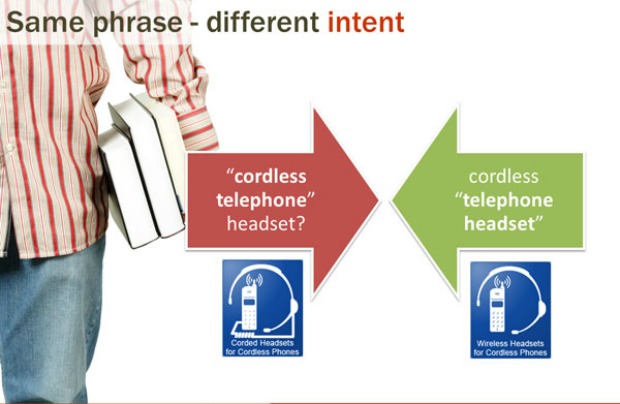Note: This post originated as a presentation that never was. At least not yet. Originally intended for Pubcon Vegas 2013, somewhere between completing it and presenting it Hummingbird happened. Therefore, this got scrapped/postponed as I worked on an entirely new presentation. But now you get to enjoy it here.

I love keyword research, but I think some people make it much harder than it needs to be. With all the tools, data, and analysis we have to work through, a simple keyword research task can turn into a pretty big chore. But it doesn’t have to be that way.
Before I go any further, I should say a few words about Hummingbird here. Most people are saying that Hummingbird has killed keyword research and long-tail keyword optimization. I disagree. Keyword research has never been about finding keywords to shove into a page for rankings. It’s about finding keywords that are relevant to your audience and use them to write authoritative content on the topic you are researching. Long-tail keywords sill matter for on-page analysis. If you’re only writing content for keywords, it’s time to rethink your content strategy, not necessarily your keyword research strategy.
Keyword research isn’t necessarily about finding the “perfect” keywords to optimize. Instead, just knowing what keywords you shouldn’t target can be all you need, at least in the early stages of research. Once you have eliminated most of the junk keywords from your keyword list, what you have left is likely going to be pretty good. So instead of running all your analysis, tools, and diagnostic on a large list of keywords, reduce your list to only the phrases that make sense. Eliminate first, diagnose what’s left. That will speed up the keyword research process and not get you bogged down in data that’s irrelevant for the moment.
Not All Keywords Are Created Equal

I was never a fan of the Batman movies until Chris Nolan took over the franchise. As much as I have always liked Michael Keaton and Val Kilmer (I can take or leave Clooney), I never liked any of them as Batman. Maybe it was the campiness of the movies, but the actors never really sold me on Batman. Then comes along Christian Bale. He nailed it. He made Batman awesome! Well, Nolan did and Christian Bale rose to the occasion.
Like actors portraying Batman, not all keywords are equal. Some are more worth your time than others, especially when there are better options available. The key is to figure out how to sort out the valuable from the invaluable keywords. Crappy keywords must be tossed to the wayside.
If you want to learn the good from the bad, without having to look at endless piles of data first, you first have to understand a few things about keywords. Let’s start with a game:
What Do These Keywords Have In Common?
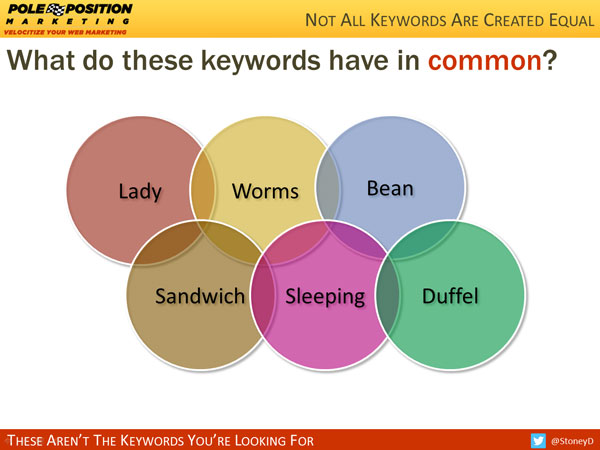
lady… worms… bean…
Figure it out yet?
sandwich…sleeping… duffel
Ok, most of you have probably figured it out. The word is Bag:
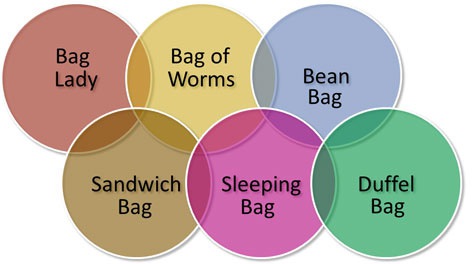
I went through that to demonstrate the fact that if you sold any one of those items, the word “bag”, though very related to what you sell, isn’t a good keyword by itself. Without the additional words used as context, it can mean almost anything. But when people are performing keyword research, they tend to think of only what it is they do.
The sporting good store selling sleeping bags thinks, “Hey, let’s optimize for “bag”, because we sell those.” At the same time, the furniture outlet guy thinks, “Hey, let’s optimize for “bag”, because we sell those.” You see the problem here. They both sell bags but not the same kind of bags at all.
So we have to get out of our own mindset and start thinking of keywords from the searcher’s perspective. As tempting as it is to think of keywords only in terms of our customers, if we do that we are likely to assume an intent that isn’t there. So to get the intent right, we have to think about our keywords from an outside-industry perspective first.
Let’s play another game:
What Does This Searcher Want?

Every search query starts with a basic word. In this case, let’s go with the word, “hot”. If that was the entire search query, what is the searcher thinking? Maybe about weather. Maybe about the sun. If you sold furnaces or wood-burners, you might think these searches are headed your way.

Ah, now we’re getting closer. Looks like the indoor heating folks have won that bet. But is this enough to fully know the visitor intent? We can make some assumptions, but maybe it’s better to look at more keywords first.

Woah! We were way off. Nothing to do with home heating, or even the weather. This searcher is looking for hot air balloons. Sorry, folks. Thanks for playing, please take your consolation prize and get off the stage! But wait. Are we sure this is what the searcher really intends. Maybe, maybe not. Let’s keep looking.

Huh. Ok, so we’re still in the hot air balloon ballpark, so all you ballooners can rest easy. Your keyword is safe. We now have a searcher that is looking for a hot air balloon ride…and you’re just the one to deliver. Oh, wait, there’s more coming…

Didn’t see that one coming! So, who’s going to be the first to sell these searcher’s a hot air balloon ride? Good luck with that!
So that’s not to say that at any level there are not searchers who mean what they type, especially “hot air balloon” and “hot air balloon pilot”. Both of those phrases are pretty dang viable and good for optimization. The point here is, it’s never a good idea to assume too much too soon, as that can get you in trouble!
Still not convinced? Let’s play again! We’ll do two at a time this time…
 |
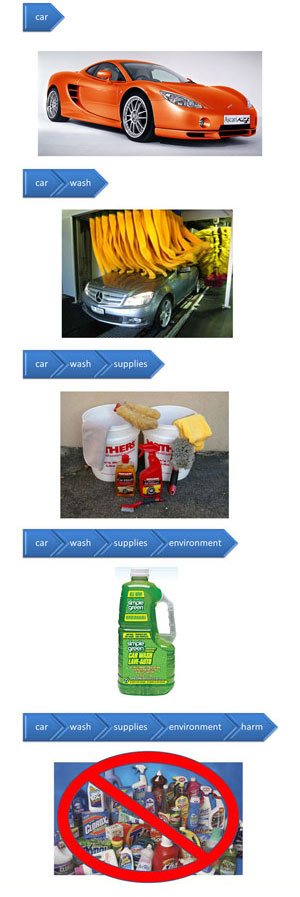 |
Okay, I think you got it.
The intent of the searcher isn’t always what we think. The fewer the words in the query, the less likely you’ll deliver what the searcher intended. That doesn’t mean it’s a bad keyword, but it should give you pause before you optimize for any phrase. Play it out. Think it through. Determine if it’s truly a viable phrase for you before investing in optimization.
Same Phrase – Different Intent
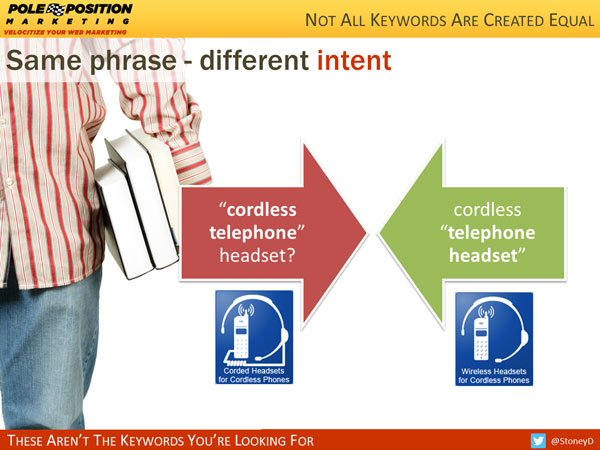
When analyzing the intent behind the keyword, you can’t just look at each as a yes/no. It’s not take it or leave it. Sometimes the answer to the question, “Is this keyword related to my business?” can be both yes and no at the same time.
This is one of my favorite slides because it relates to an actual experience I had at my local office supply store. Unfortunately for me, I was unable to find the cordless telephone headset I wanted. Instead all I found was a cordless telephone headset.
Let me rephrase that sentence. Unfortunately for me, I was unable to find the cordless “telephone headset” I wanted. Instead all I found was a “cordless telephone” headset. That’s right, I was looking specifically for a cordless headset for my telephone. But they only had headsets for cordless telephones. If I was searching for this phrase on Google and seen similar results I would have abandoned those keywords and clarified my search to better produce the results I wanted.
This is a great example how one phrase, written the exact same way, can mean something very different from what you think. The question is, how do you determine which is the “right” way to interpret this keyword? Simple. Do a Google search and see what comes up. If all you find is “cordless telephone” headsets, then you may not make much headway optimizing your cordless “telephone headsets” for that particular phrase. At the very least it gives you something to think about.
This gives you a good basis for understanding that the keywords we are looking for in our research aren’t always the keywords we are looking for to bring us success. I’ll go into this further in a follow-up post titled “Lessons in Keyword Stupidity” where I’ll walk through specific types of keywords that you want to avoid as part of your optimization strategy.
Image Credit: all images created by author

